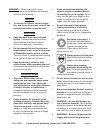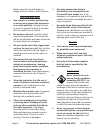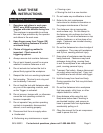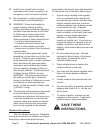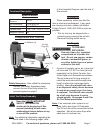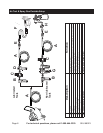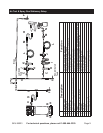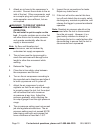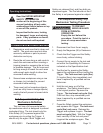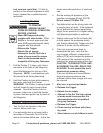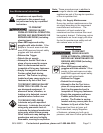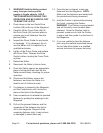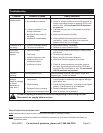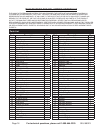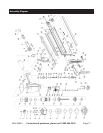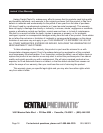
Page 12 For technical questions, please call 1‑800‑444‑3353. SKU 68023
tool must not cycle (re). If it fails to
perform in the manner explained in bold,
have it repaired by a qualied service
technician.
Loading the Tool
TO PREVENT
SERIOUS INJURY
FROM ACCIDENTAL OPERATION,
BEFORE LOADING:
• Wear ANSI‑approved safety
goggles with side shields. Other
people in the work area must also
wear ANSI-approved impact safety
goggles with side shields.
• Release the Trigger.
• Detach the air supply.
• Attempt to re the Tool into a
piece of scrap wood to ensure
that it is disconnected and is
incapable of ring any fasteners.
1. Pull the Pusher (71) down until it locks
into place at the back of the Magazine.
2. Insert the fasteners into the top of the
Magazine. NOTE: Load fasteners with
the pointed ends facing downward.
3. Hold the Pusher in place while pressing
the Latch, unlocking the Pusher.
WARNING! The Pusher is spring-loaded
and will forcefully move forward when
released. Once the Position Latch is
pressed, make sure to hold the Pusher
in place, and then guide it up the back of
the Magazine.
General Operating Instructions
1. Test the Tool, as directed in the prior
section, before each use.
2. If an automatic oiler is not used, add a
few drops of Pneumatic Tool Oil to the
airline connection before use. Add a few
drops more after each hour of continual
use.
3. Set the working air pressure on the
regulator to between 60 and 120 PSI.
Do not exceed 120 Max. PSI.
4. Test before rst use by driving nails into
a sample piece of wood. If the fasteners
do not achieve the desired penetration,
adjust the air pressure to a higher setting
until desired penetration is achieved.
5. Always make sure the Drive Guide (54)
is ush against the workpiece during
use. Always release the Trigger once the
fastener is driven into the workpiece.
6. If the tool requires more force to
accomplish the task, verify that the
tool receives sufcient, unobstructed
airow (CFM) and increase the pressure
(PSI) output of the regulator up to the
maximum air pressure rating of this tool.
CAUTION! TO PREVENT TOOL AND
ACCESSORY FAILURE, RESULTING
IN INJURY: Do not exceed the tool’s
maximum air pressure rating.
If the tool still does not have sufcient
force at maximum pressure and
sufcient airow, then a larger tool may
be required.
7. After use, to prevent accidents:
a. Release the Trigger.
b. Detach the air supply.
c. Attempt to re the Tool into a piece
of scrap wood to ensure that it is
disconnected and is incapable of
ring any fasteners.
d. Release the Trigger.
e. Clean external surfaces with clean,
dry cloth.
f. Store indoors out of children’s reach.



